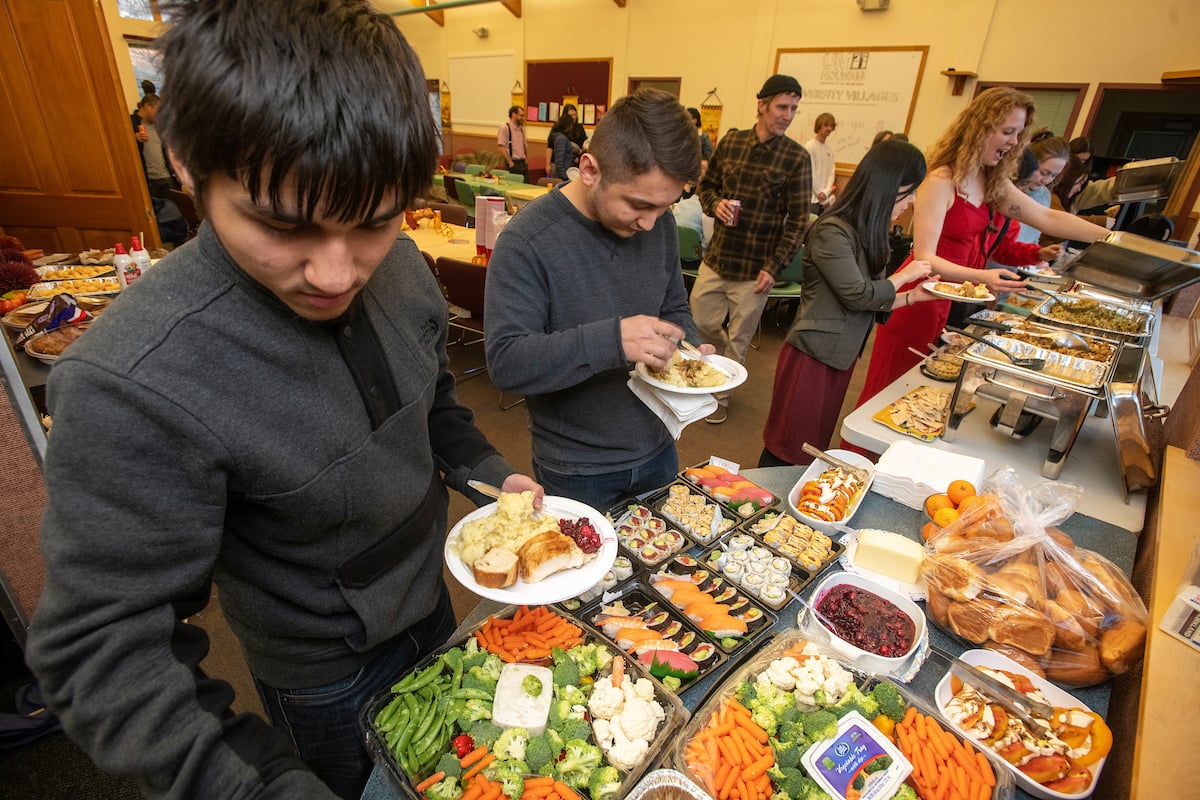Four Holidays Tips from UM Humanities

It’s that time of year when the tables are long, opinions are strong and conversations can run hotter than the gravy boat.
From Aunt Goldie’s take on gerrymandering to cousin Jerry’s theories about the inflation of organic pumpkin puree, the holidays can leave us overstimulated and out of patience.
But researchers in the University of Montana’s College of Humanities and Social Sciences suggest treating the season as professional development in disguise. “At UM, we know the humanities and social sciences don’t just teach us how to think — they teach us how to relate,” Interim Dean and Professor Christina Yoshimura said. “As technology races ahead, these timeless, human skills only grow in value.”
Faculty from UM’s College of Humanities and Social Sciences rounded up their best communication tips from language, communication studies, psychology and poetry to help you enjoy the holidays and keep the peace and gravy flowing. Check them out yourself and emerge this holiday season as the grounded, compassionate individual that your family and your future need:
Go Ahead, Talk with Your Mouth Full

First, Yoshimura has found that talking while eating can be good for our relationships.
“One of the best things to do in tense communication situations is to maintain self-regulation, so that you can choose to communicate to share perspectives and information, rather than to engage in defensiveness and attack,” she said.
“Consider leveraging the fact that our calming, parasympathetic nervous system is connected by the very process of eating,” Yoshimura said.
Her research has shown that talking while eating is associated with communication focused on relational connection, such as playfulness, sharing information about the self and seeking information about others, reminiscing and planning for the future.
“Lucky for all of us, when we are eating, we are more likely to go into a rest and digest state than a fight or flight state,” Yoshimura said.
Attempt a Toast…or Tea

UM Russian Professor Ona Renner-Fahey said that Slavic cultures have a long tradition of bonding over beverages. “They take their toasts and tea very seriously,” she said.
Making toasts at meals—especially during celebrations and holidays—is a wonderful way to reflect on why everyone is gathered together, and to acknowledge one another and the meal, Renner-Fahey said.
“In the Slavic tradition, toasts can be very long and philosophical but even a short and simple toast can do wonders to acknowledge the work that was done in the kitchen, or the rarity of getting the family together,” she said. Post-dinner tea (or coffee) drinking offers another opportunity for connection.
“Tea drinking in Russia, as in other world cultures, was a daily ritual and occasion for conversation,” Renner-Fahey said. “In fact, it was so central to daily life that the word for restaurant ‘tips’ translates as ‘tea money’.” Even the pace of making tea, waiting for it to boil and then steep, can create a sense of calm after the holiday bustle.
There’s No Such Thing as “Bad” Food

The holidays can be a challenging time for many with eating disorders and complicated relationships with food and body image.
During meals with loved ones, UM Psychology Professor Caitlin Martin-Wagar recommends that gatherers avoid moralizing food (for example, describing foods as “bad” or “good”), voicing food guilt (judging yourself for having certain foods) or making negative comments about food or bodies.
Instead, Martin-Wagar recommends focusing on more engaging conversation topics.
“We humans are much more interesting than the latest diet we’re on or how our bodies look,” she said. “Loved ones will feel more comfortable and connected with each other when we start conversations based on more meaningful topics.”
Recognize the Care and the History That are Part of the Meal

UM Creative Writing Professor Sean Hill writes in his poem, “In the Kitchen with Celia,” from his forthcoming book, “The Negroes Send Their Love: Poems, Perspectives, and Possible Futures” that meals made for us, by people who have made them and the instruments they use, all carry an intergenerational inheritance that gets passed down.
“Some kitchen objects have handles worn smooth by hands, an incidental rubbing with sweat and oils, and pots and pans carry seasoning (contain processes and eventualities - kitchen memories) and their heft has weight, can transport us with a touch or a taste of the food from them. Objects bear witness to kitchen witnesses - cooks.”
Hill’s poem specifically celebrates African American contributions to American food culture. It recognizes enslaved cooks like Celia and all the unsung Black cooks feeding their families and communities. “We can all choose to turn our attention to the history that is being brought to life before us when we are lucky enough to have a meal cooked for us,” Hill said.



